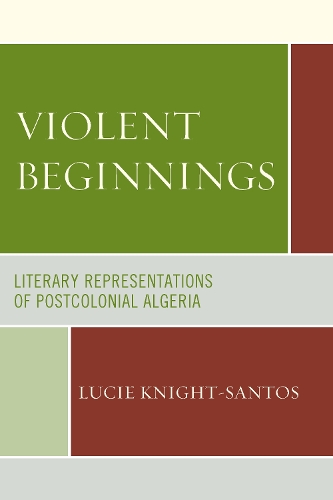
Violent Beginnings: Literary Representations of Postcolonial Algeria
(Hardback)
Publishing Details
Violent Beginnings: Literary Representations of Postcolonial Algeria
By (Author) Lucie Knight-Santos
Bloomsbury Publishing PLC
Lexington Books
24th October 2014
United States
Classifications
Professional and Scholarly
Non Fiction
Political structure and processes
National liberation and independence
809.8965
Physical Properties
Hardback
128
Width 163mm, Height 239mm, Spine 15mm
308g
Description
From a colonial campaign that was envisioned by France as the redemption of its Algerian children" through Western civilization to Algerian Independence that was lived by both parties as a bloody divorce; recent Algerian history has been imagined and represented in terms of the family. Prominent authors such as Kateb Yacine and Mouloud Mammeri pondered their own fate during the War of Independence as the mixed children of a failed colonial marriage. Contemporary postcolonial authors such as Rachid Boudjedra, Yasmina Salah, and Arezki Mellal have filled their narratives with orphaned children searching for ideal parents as a civil war ripped Algeria apart in the 1990s. Violent Beginnings: Literary Representations of Postcolonial Algeria explores how violence, during the War of Independence (19541962) to the more recent civil war (19912002), has shaped literary representations of both family and nation in contemporary literature. For example, discussions of the struggle for independence in Assia Djebars La femme sans spulture and Ahlam Mostaghanemis Memory of the Flesh, represent sexual torture associated with this earlier war period as having a negative impact on victims ability to have children and contribute to the development of the Algerian nation. Texts examining the more recent civil war such as Rachid Boudjedras La vie lendroit and Yasmina Salahs Glass Nation establish a link between the earlier violence of the independence struggle and contemporary events. Additionally, these texts proceed to demonstrate how violence has shaped familial and national structures, more specifically causing distorted familial bonds and political chaos in contemporary Algerian society.
Reviews
Knight-Santos engaging and solid study of Algeria's traumatic history through the lenses of gender and literature provides an original and provocative contribution to Arabic literary criticism and to postcolonial theory. -- Miriam Cooke, Duke University
Author Bio
Lucie Knight-Santos is an instructor at the Hun School of Princeton where she teaches Arabic language, French language, and literature courses.
